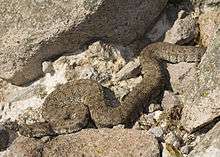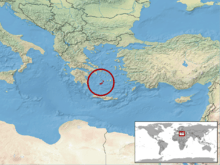Macrovipera schweizeri
Macrovipera schweizeri is a species of venomous snake in the family Viperidae. The species is endemic to the Cyclades Archipelago in the Aegean sea.[1][5] No subspecies are currently recognized.[5][6]
| Macrovipera schweizeri | |
|---|---|
 | |
| Scientific classification | |
| Kingdom: | Animalia |
| Phylum: | Chordata |
| Class: | Reptilia |
| Order: | Squamata |
| Suborder: | Serpentes |
| Family: | Viperidae |
| Genus: | Macrovipera |
| Species: | M. schweizeri |
| Binomial name | |
| Macrovipera schweizeri (F. Werner, 1935) | |
 | |
| Synonyms[2] | |
| |
Etymology
The specific name, schweizeri, is in honor of German herpetologist Hans Schweizer (1891–1975).[7]
Description
Macrovipera schweizeri grows to an average total length (including tail) of 50–70 cm (20–28 in), with a maximum of 98.5 cm (38.8 in).[3]
Geographic range
Macrovipera schweizeri is found on the Greek islands of the Cyclades Archipelago in the Aegean Sea: Milos and the three smaller, adjacent islands of Siphnos, Kimolos and Poliaigos.[1][2][3] The type locality is given as "Insel Milos ".[2][5]
Conservation status
This species, M. schweizeri, is classified as Endangered (EN) according to the IUCN Red List of Threatened Species with the following criteria: B1ab(iii,v) (v3.1, 2001).[1] This indicates that the extent of its occurrence within its geographic range is estimated to be less than 5,000 km² (1,930 sq mi), that its populations are severely fragmented or known to exist at no more than five locations. Furthermore, a continuing decline is observed, inferred or projected in the area, extent and/or quality of habitat, as well as the number of mature individuals.[1]
So listed because its extent of occurrence is, in fact, not much greater than 100 km² (39 sq mi) – it is known from only four small islands. There is continuing decline in the extent and quality of its habitat, and it is experiencing a decline in the number of mature individuals due to persecution and over-collecting. Year assessed: 2009.[1]
It is also listed as strictly protected (Appendix II) under the Berne Convention.[8]
Venom
It is narrated by G.A. Boulenger in his book The Snakes of Europe that "Dr. de Bedriaga observed this much dreaded snake, the bite of which is probably as bad as that of its Indian ally, the Daboia, Vipera russelli ". It is probable that the snake he assumed was Macrovipera lebetina is in fact the Milos Viper.
References
- Böhme W; Lymberakis, Petros & Andrén, Claes (2009). "Macrovipera schweizeri". IUCN Red List of Threatened Species. 2009: e.T12654A3369754. Retrieved 29 July 2020.
- McDiarmid RW, Campbell JA, Touré TA (1999). Snake Species of the World: A Taxonomic and Geographic Reference, Volume 1. Washington, District of Columbia: Herpetologists' League. 511 pp. ISBN 1-893777-00-6 (series). ISBN 1-893777-01-4 (volume).
- Mallow D, Ludwig D, Nilson G (2003). True Vipers: Natural History and Toxinology of Old World Vipers. Malabar, Florida: Krieger Publishing Company. 359 pp. ISBN 0-89464-877-2.
- Steward JW (1971). The Snakes of Europe. Cranbury, New Jersey: Associated University Press (Fairleigh Dickinson University Press). 238 pp. LCCCN 77-163307. ISBN 0-8386-1023-4.
- Macrovipera schweizeri at the Reptarium.cz Reptile Database. Accessed 29 July 2020.
- "Macrovipera schweizeri". Integrated Taxonomic Information System. Retrieved 29 July 2020.
- Beolens, Bo; Watkins, Michael; Grayson, Michael (2011). The Eponym Dictionary of Reptiles. Baltimore: Johns Hopkins University Press. xiii + 296 pp. ISBN 978-1-4214-0135-5. (Macrovipera schweizeri, p. 239).
- Convention on the Conservation of European Wildlife and Natural Habitats, Appendix II at Council of Europe. Accessed 9 October 2006.
Further reading
- Werner F (1935). "Reptilien der Ägäischen Inseln ". Sitzungberichte der Kaiserlichen Akademie der Wissenschaften in Wien 1244: 81–117. (Vipera lebetina schweizeri, new subspecies, p. 117). (in German).
External links
| Wikimedia Commons has media related to Macrovipera schweizeri. |
- Cyclades blunt-nosed viper (Macrovipera schweizeri) at ARKive. Accessed 26 September 2006.
- Macrovipera schweizeri at Amphibians and Reptiles of Europe. Accessed 9 October 2006.
